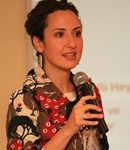In an attempt to foster greater collaboration among foundations and donor networks, the EFC, in cooperation with DAFNE (Donors and Foundations Networks in Europe, 21 members across Europe collectively serving more than 5,500 donors and foundations), held its first ‘Autumn Assembly’ on 7 November 2011 at the European Economic and Social Committee Building in Brussels.
The Assembly was a ‘mega-panel’ of six consecutive sessions, seamlessly moderated by Jenny Hodgson of the Global Fund for Community Foundations. Nearly 150 participants listened intently and engaged with 13 speakers on subjects including accountability and transparency, codes of practice, allocation of assets, technology, diversity and more. As one participant put it, the sessions were just long enough to spark a debate to be pursued later in more in-depth discussions.
Some rather interesting ‘sparks’ included the following:
Less is more
In a live poll (conducted before and after each session), nearly half the audience stated they were doing all they could to promote accountability and transparency, while the other half felt they could be doing more. Both camps were eager to learn about the new EFC and DAFNE report Transparency and Accountability: Regulation of Public Benefit Foundations in Europe, which was launched at the meeting. The study analysed legal frameworks and European foundation practices and challenges in the EU 27 (plus Switzerland, Turkey, Ukraine). Nineteen self-regulatory codes were identified and analysed, leading the authors to conclude that rather than create new regulations, the EU should do more to foster exchange of new practices developed by umbrella organizations.
In a subsequent yet related panel on codes of practice and conduct, more than half the audience expressed a desire for EFC and DAFNE to do more than promote and monitor basic codes of practice and raise the bar with more aspirational principles that challenge European foundations.
Function, not form
The often binary debate of ‘limited life vs perpetuity’ took participants beyond form to function. Function or purpose, proposed one participant, is the critical factor in determining what approach to take when making decisions about whether to endow or spend down. Some issues naturally bring greater urgency (eg malaria) while others are more long-term challenges (eg early childhood education). While this resonated with many, live polling of the audience indicated that nearly 70 per cent favoured establishing foundations in perpetuity. One participant even suggested (tongue in cheek) that those looking to ‘spend down’ should give to foundations working in perpetuity. In all seriousness, the point that we are passing on problems to future generations, and that this requires us also to be passing on resources to deal with those problems, was one that was well taken.
Keeping up with the times?
When it comes to technology, nearly half the audience said they were ‘keeping up with the times’. Yet when asked for a show of hands of those using Twitter for work on a regular basis, there were only a few stragglers … and it was at this point that the man next to me asked ‘What is Twitter anyway?’ In any case, foundations that are incorporating new technologies had some quite interesting examples to share. I benefited greatly from the European Cultural Foundation’s visual map of how they link their social media strategy to their various programmes and audiences.
The diversity debate
The diversity debate was not much of a debate per se; more than half of the participants agreed that more diverse boards and staff are more efficient and effective in the long term. Yet while many inherently seem to understand the logic that heterogeneous groups are more likely to make better decisions, overall there seemed to be a great lack of understanding of how to apply principles of diversity in boards, staff and other communities with which foundations work. Certainly a subject for further debate.
Filiz Bikmen is director of programs and international relations at the Sabanci Foundation and a member of the Governing Council of the European Foundation Centre.







Comments (1)